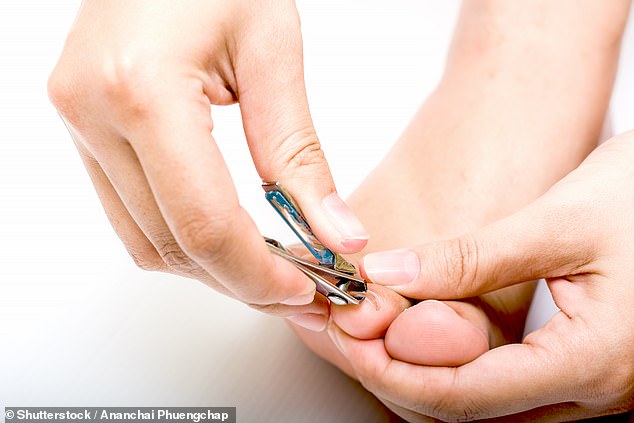We all know by now that wet wipes should never be flushed down the toilet.
But experts have revealed 11 other surprising items that could wreak havoc on your pipes.
While many people trim their nails over the toilet, clippings are an absolutely no–no, according to the team at Rentokil Specialist Hygiene.
Tampons, hair cuttings, and contact lenses should also be avoided – along with dead goldfish.
‘Only the three P’s – Pee, Poo and Paper, should ever be flushed down the toilet,’ said Jamie Woodhall, UK Technical and Innovations Manager at Rentokil Specialist Hygiene.
‘Any other items are unlikely to break down quickly or even naturally in water, including dead goldfish.
‘Even small things such as nail clippings are solid, being primarily made of keratin, which is both tough and fibrous.
‘Although nail clippings are technically biodegradable, they decompose very slowly and will take years, meaning they can easily combine with other waste like wet wipes, and period products to create a solid mass as they travel down pipework and into the sewer system.’

While many people trim their nails over the toilet, clippings are an absolutely no–no, according to the team at Rentokil Specialist Hygiene
To celebrate ‘Unblocktober’, Rentokil Specialist Hygiene surveyed 2,074 Brits about their flushing habits.
And the results revealed that many of us are still flushing items that would be best placed in the bin.
Nail clippings (35 per cent) topped the list as the most common item people mistakenly think they can flush.
This was followed by paper towels (34 per cent), hair cuttings (34 per cent), and deceased fish (26 per cent).
Somewhat unsurprisingly, wet wipes (14 per cent) and tampons (19 per cent) are also still ending up in the toilet.
‘In reality, these items contain hidden plastics, contributing to persistent blockages, waterway pollution, and greater flooding risks during periods of heavy rain,’ Rentokil Specialist Hygiene added.
In addtion, many Brits are still getting it wrong over in the kitchen.
The survey found that 14 per cent think it’s OK to put chewing gum down the sink, while 10 per cent are still pouring cooking oil, fat, or grease down there.

Nail clippings (35 per cent) topped the list as the most common item people mistakenly think they can flush. This was followed by paper towels (34 per cent), hair cuttings (34 per cent), and deceased fish (26 per cent) (stock image)
‘When it comes to the kitchen you should only pour water based products down a sink, or those that are water soluble,’ Mr Woodhall advised.
‘The top culprits we see for blocking drains in homes and commercial spaces are products that contain grease, fats and oil; expanding foods such as rice and pasta; flour; coffee grounds; and paint.’
While flushing the wrong items down the toilet might not immediately affect you, they could have dramatic impacts on the sewers deep beneath our feet.
‘Blocked drains and sewers are more than just an inconvenience, they can lead to environmental damage, costly clean-ups, and even the flooding of homes and businesses,’ Mr Woodhall added.
The news comes shortly after Thames Water shared stomach–churning photos of an enormous ‘fatberg’ recovered from a sewer in Feltham.
Weighing in at 100 tonnes, the congealed mass of wet wipes, fat, oil, and grease is the equivalent of eight double–decker buses.
It was stuck in a sewer more than 10 metres below street–level – meaning it took experts more than a month to remove.
‘The clearance of this fatberg was hugely complex for our team of engineers and shows some of the challenges we face,’ said Alexander Dudfield, Engagement Lead for Network Protection at Thames Water.

The news comes shortly after Thames Water shared stomach–churning photos of an enormous ‘fatberg’ recovered from a sewer in Feltham
‘But while some blockages in our biggest sewers can weigh as much as 25 elephants, we must not forget most blockages occur in local pipes – often narrower than a mobile phone and usually caused by a few households.
‘When these pipes get blocked, we can’t simply switch off the sewage.
‘It backs up and must come out somewhere, whether that’s roads, rivers or even people’s homes.
‘The consequences can be devastating.’
This article was originally published by a www.dailymail.co.uk . Read the Original article here. .


